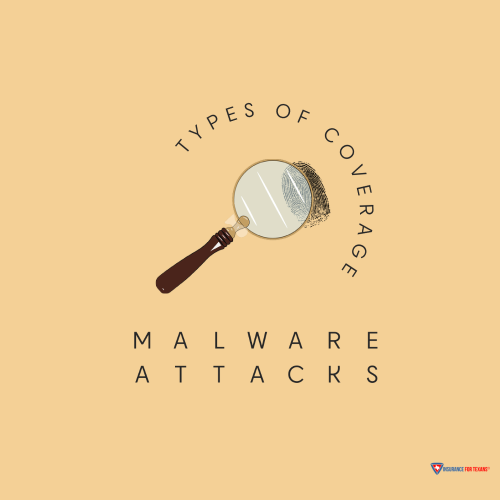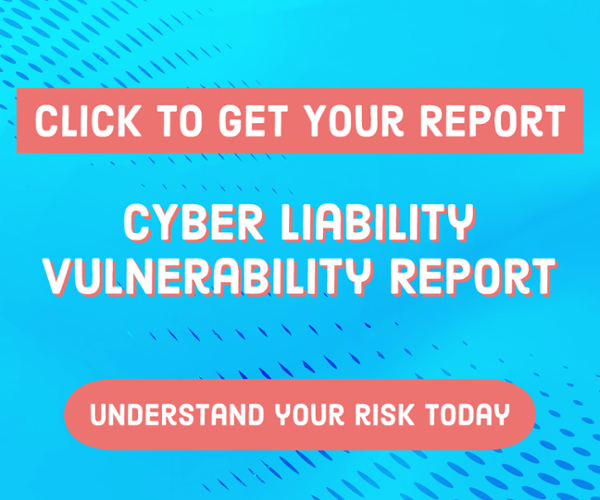If you run a legitimate business in Texas today, you use a computer. Somewhere. We all do. Sure, you may still operate on a cash only basis, but you're still using a computer somewhere. I'm pretty sure that even the neighborhood teenager mowing lawns is using one to keep track of his business. It's the reality of life. Along with that reality is that our computers are connected to the internet and that brings with it the risk of a cyber attack of some sort. And as you add employees and additional connected pieces of equipment, your risk of attack goes up exponentially. You may not have faced it yet, but you know in the back of your mind that it is there. So what do we as Texas business owners do?
Cyber Insurance is a type of insurance coverage that provides financial protection to businesses in the event of cyber incidents such as security breaches, malware infections, or ransomware attacks. It is specifically designed to mitigate the financial losses and liability that can arise from cyber threats and cyber attacks. Cyber Insurance policies typically cover a range of costs and damages, including the expenses incurred for incident response, legal services, credit monitoring services, reputational damage, and even business interruption. These policies can provide coverage ensuring that businesses have the necessary resources to recover from a cyber event and protect themselves against potential lawsuits and financial burdens. One of the key aspects of Cyber Insurance is that it covers malware infections, offering businesses a safety net against the damages caused by malicious software and cyber extortion.

What is Malware?
Malware, short for malicious software, refers to any software specifically designed to harm or infiltrate a computer system. It comes in various forms, including viruses, worms, Trojans, ransomware, spyware, and adware.
This malicious software can infiltrate a network through various means, such as email attachments, infected websites, or external storage devices. Once inside a network, malware can cause significant damage. It can steal sensitive data, compromise system security, disrupt operations, and even hold data hostage to demand a ransom.
Recent examples of malware attacks include the WannaCry ransomware attack in 2017, which affected hundreds of thousands of systems worldwide, and the NotPetya malware attack in 2016, which caused massive financial losses for businesses globally.
Given the increasing prevalence and sophistication of malware, it is crucial for businesses to protect themselves. Cyber insurance policies can provide coverage for damages resulting from malware attacks. These policies typically cover financial losses, legal expenses, credit monitoring services, and even reputational damage resulting from a cyber incident.
By investing in cybersecurity insurance, Texas business owners can mitigate the potential damages caused by malware and other cyber threats, ensuring the continuity and resilience of their operations.
Understanding How Cyber Insurance Covers Malware Attacks
Businesses are facing new and evolving threats daily from cyber incidents such as malware attacks. These attacks can have devastating consequences, causing financial losses, disrupting operations, and compromising sensitive data. That's why it's important for Texas business owners to understand how a cyber liability insurance policy can provide coverage for these types of attacks. Let's explore the ways in which cyber insurance policies can protect businesses from the damages caused by malware attacks. From financial losses to reputational damage, cyber insurance policies offer comprehensive coverage and peace of mind in the face of ever-growing cyber risks.
What Does Cyber Insurance Cover?
Cyber insurance is a critical component of a comprehensive risk management strategy for businesses in Texas and beyond. This specialized insurance coverage helps protect businesses from the financial losses and potential liabilities associated with cyber risks.
Cybersecurity insurance policies typically cover a range of cyber incidents, including privacy risks, security risks, operational risks, and service risks. Privacy risk coverage helps businesses respond to and recover from incidents involving the theft or exposure of sensitive customer or employee data. Security risk coverage addresses expenses related to cyber attacks and data breaches, such as forensic investigations, notifications to affected parties, and credit monitoring services.
Operational risk coverage focuses on business interruption and the required expenses to restore systems and operations after a cyber event. This includes costs associated with restoring data, hiring experts, and implementing security measures to prevent future incidents. Service risk coverage provides protection against claims arising from the failure to provide professional services, such as consulting or IT support, due to a cyber attack.
Cyber insurance policies typically include four distinct insuring agreements: first-party coverage, third-party coverage, business interruption coverage, and cyber extortion coverage. First-party coverage addresses direct losses incurred by the insured business itself, while third-party coverage covers claims made against the insured by external parties affected by a cyber event. Business interruption coverage compensates for lost income and increased expenses resulting from a cyber attack, while cyber extortion coverage helps cover expenses associated with ransom demands or cyber extortion attempts. It offers financial protection and support services to help businesses recover from cyber incidents and mitigate potential liabilities.
How Does Cyber Insurance Specifically Protect Against Malware Attacks?
Cyber insurance plays a vital role in protecting businesses against malware attacks by providing financial support and technical assistance during and after an incident. Malware attacks can have devastating consequences, including financial losses, reputational damage, and operational disruption. Cyber coverage is designed to help mitigate these risks and support businesses in their recovery efforts.
One of the key ways cyber insurance protects against malware attacks is by offering coverage for financial losses. This includes expenses related to investigation, remediation, and restoration of systems and data. Insurers may also cover the costs of legal services, credit monitoring services for affected customers, and even business interruption losses resulting from a malware attack.
In addition to financial support, cyber insurance policies often include access to technical assistance. This can include expert guidance on cybersecurity best practices, assistance in investigating the incident, and help in implementing security measures to prevent future attacks. Insurers may also provide resources and support in handling ransomware demands or other forms of cyber extortion.
To qualify for cyber insurance coverage, insurance companies may require businesses to have strong defenses in place to mitigate cyber risk. This can include measures such as regular software updates, robust firewalls, employee training in cybersecurity awareness, and encryption of sensitive data. Having these preventive measures in place can help businesses reduce their risk profile and potentially lower their cyber insurance premiums.
These measures provide financial protection, technical support, and encourage a proactive approach to cybersecurity to minimize the impact of such attacks by the dangerous threat actors who want to damage not only your business, but also your business.

Types of Coverage Offered for Malware Attacks
The cyber insurance market offers various types of coverage for malware attacks, providing protection for businesses facing the challenges associated with cyber incidents. However, organizations may encounter limitations and potential exclusions when seeking coverage for malware-related losses.
Some cyber insurance companies may have specific requirements or limits on the coverage provided for ransom payments. Additionally, coverage for reputational damage, physical damage, or loss of intellectual property due to a malware attack may vary depending on the policy.
Factors that can affect the coverage offered by cyber insurance policies for malware attacks include the type of attack and its financial impact on the business. Insurance companies may assess the severity of the incident and the security measures in place before providing coverage. It is important for businesses to have strong defenses in place, such as regular software updates, robust firewalls, and employee training in cybersecurity, to mitigate cyber risks and potentially lower the premiums for cyber insurance coverage.
Cyber insurance policies can offer valuable coverage for malware attacks, including financial support, technical assistance, and additional services. However, organizations should carefully review their policies to understand any limitations or exclusions and ensure they have appropriate security measures in place to mitigate cyber risks.
Where Does Cyber Insurance Fall Short in Protecting Against Malware Attacks?
When it comes to protecting against malware attacks, cyber insurance policies may fall short in several areas. While these policies offer coverage options for investigation, remediation, and restoration of systems and data affected by cyber incidents, there are certain limitations and exclusions to consider.
First, most cyber insurance policies may not cover pre-existing vulnerabilities. If a business had inadequate security measures in place prior to the attack, the cyber insurance provider may argue that the business failed to exercise due diligence, resulting in denial of coverage.
Second, intentional acts may not be covered. If an employee intentionally installs or spreads malware, the policy may not cover the resulting damages. Another common exclusion is related to an employee's use of their own computer. If an employee uses their personal device to access company systems and that device becomes infected with malware, the policy may not cover the damages.
Unauthorized access is another area that may not be covered. If a cybercriminal gains access to sensitive data due to lax security measures or weak passwords, this may be viewed as negligence and coverage may be denied.
While cyber insurance can provide valuable financial support in the aftermath of a malware attack, it is important for businesses to understand the limitations, exclusions, and requirements for claims associated with their policies. Implementing robust cybersecurity measures and regularly reviewing and updating the policy can help mitigate coverage gaps and ensure adequate protection against malware attacks.
Common Exclusions to the Coverage Provided by Cyber Insurance Policies for Malware Attacks
Cyber insurance policies provide crucial financial protection for businesses in the event of cyber incidents, including malware attacks. However, there are common exclusions to the coverage provided by these policies when it comes to malware attacks. Understanding these exclusions is essential for Texas business owners who are concerned about their cyber insurance coverage so that they can make informed decisions and take necessary precautions to protect themselves from potential financial losses.
The Level of Security in Place Before the Attack Occurred
The level of security in place before a cyber attack occurs is vital in minimizing the potential damages and financial losses. Cyber insurance policies offer a network security coverage grant that addresses various aspects of network security. This coverage extends to data breaches, malware infections, cyber extortion demands, ransomware attacks, and business email compromises.
To prevent such attacks, businesses should focus on implementing robust security measures, including Identity and Access Management (IAM) software. IAM software helps prevent privilege creep, a common vulnerability that occurs when employees have unnecessary access to sensitive information. Multi-factor authentication (MFA) can also limit unauthorized access by limiting the ability of a bad threat actor from gaining access to your network. By minimizing the risk of unauthorized access, businesses can significantly reduce the potential damage caused by cyber attacks.
Businesses should prioritize their security measures and consider implementing IAM and MFS software o prevent cyber attacks and minimize the financial impact of a potential incident.
Pre-existing Vulnerabilities, Conditions, and Weaknesses Not Covered by Most Policies
When it comes to cyber insurance policies, business owners should be aware of the pre-existing vulnerabilities, conditions, and weaknesses that are typically not covered. Understanding these exclusions is crucial, especially in the context of malware attacks.
Most cyber insurance policies do not cover pre-existing vulnerabilities, which refers to any weaknesses in a business's IT systems or security measures that existed before the policy was purchased. These vulnerabilities may include outdated software, lack of employee training, or inadequate firewalls. In the event of a malware attack, if these pre-existing weaknesses are found to be the cause or contributing factor, the insurance provider may deny coverage for the resulting damages.
Similarly, certain conditions may not be covered by cyber insurance policies. For example, if a business fails to regularly update its security software or neglects to implement necessary patches, any damages resulting from a malware attack may not be covered. Additionally, if a company fails to comply with industry-specific security regulations or best practices, its policy may not provide coverage for losses arising from a cyber incident.
It is essential for business owners to be aware of these exclusions when selecting a cyber insurance policy. By addressing and rectifying pre-existing vulnerabilities and ensuring compliance with security conditions, businesses can obtain more comprehensive coverage for malware attacks and other cyber threats. This proactive approach can help protect against potential financial losses and reputational damage in the event of a cyber incident.
Policy Exclusions Related to Intentional Acts Committed by an Insured Entity or Its Employees
One important aspect to consider when purchasing a cyber liability policy is the exclusions related to intentional acts committed by an insured entity or its employees. These exclusions can have a significant impact on the coverage provided for cyberattacks and malware incidents.
Cyber insurance policies typically exclude coverage for intentional acts that are committed by the insured entity or its employees. This means that if a business or its employees purposely engage in activities that result in a cyber incident, such as intentionally installing malware or conducting a cyber attack, the insurance policy may not cover the resulting damages or losses.
The rationale behind these exclusions is to prevent businesses from engaging in harmful or illegal activities and then seeking insurance coverage for the consequences. By excluding intentional acts from coverage, insurance providers can ensure that their policies are not abused and that coverage is provided for legitimate cyber incidents that come from technology errors or bad actors.
Examples of intentional acts that may be excluded from cyber insurance policies include employees intentionally stealing or misusing sensitive data, intentionally causing damage to computer systems, or intentionally transmitting malware to disrupt operations. If any of these intentional acts occur, the insured entity may not be able to rely on their cyber insurance policy to provide coverage for the resulting damages.
Unauthorized Access Exclusions Related to an Employee's Use of Their Own Computer
With the advancement of work from home, telecommuting, and business travel, many companies have allowed employees to use their own device. When it comes to cyber liability insurance and data breach coverage, it's important for Texas business owners to understand the exclusions related to an employee's use of their own computer or phone.
Many cyber insurance policies contain unauthorized access exclusions. These exclusions typically state that coverage will not be provided if an employee uses their personal computer to access sensitive company information without proper authorization. This means that if an employee uses their own computer to intentionally or unintentionally cause a cyber incident or security breach, the resulting damages may not be covered.
For example, let's say an employee decides to work from home and uses their personal computer to access the company's network. However, the employee's computer is infected with malware, which then spreads to the company's network, causing substantial damage. In this scenario, the cyber insurance policy may exclude coverage for the damages caused by the malware infection because the employee's use of their own computer resulted in the unauthorized access.
These exclusions aim to prevent insurance policies from being exploited by businesses or employees engaging in intentional or negligent actions that lead to cyber incidents. However, it also means that businesses must take precautions to ensure that their employees' personal computers are secure and do not pose a risk to the company's network.
And don't overlook the use of phones in this exclusion. Most employees are using their iPhone or Android to get to their email, cloud storage, or other items on the network. This can be classified as a computer in a cyber insurance claim scenario. Taking appropriate security measures and implementing strict policies regarding employee computer use can help mitigate the risks associated with these exclusions and ensure adequate coverage in the event of a data breach or cyber incident.

The Financial Impact of a Malware Attack on a Business or Organization
A malware attack can have a devastating financial impact on a business or organization. Apart from the immediate costs associated with malware removal and system recovery, there are several other long-term expenses that business owners need to consider.
One significant financial consequence of a malware attack is reputational damage. A business's reputation is crucial, and a high-profile cyber incident can lead to a loss of trust among customers and partners. Rebuilding a tarnished reputation can be a costly and time-consuming process.
Malware attacks can also result in class-action lawsuits from customers or shareholders affected by the breach. These lawsuits can be financially draining, requiring businesses to cover legal fees, potential settlements, and compensation for damages.
Regulatory action is another financial consequence that businesses need to be aware of. In the event of a significant data breach, regulatory bodies may impose fines and penalties for failing to protect customer data adequately. These fines can be substantial and can further strain a business's finances.
System rebuilding costs are another consideration. After a malware attack, businesses often need to invest in upgrading their security infrastructure and implementing stronger measures to prevent future incidents. This can be expensive, especially for small or midsize businesses with limited budgets.
While cyber insurance can provide some financial support in the aftermath of a malware attack, it's important to understand the limitations of coverage. Cyber insurance policies typically have limits and exclusions, and may not cover all the financial losses incurred due to reputational damage or long-term expenses.
What Can I Do To Protect My Business?
Given the financial impact of a malware attack on a business or organization goes beyond immediate costs, you really need to work with an independent insurance agent who specializes in the Cyber Insurance Industry. The average cost of a cyber liability insurance quote keeps increasing because of the continued increase in claims. Working with an expert agent who can guide you to the right forms of insurance at the best pricing for your type of cyber risk insurance will allow you to get maximum value while also minimizing your financial costs.
If you would like to evaluate your requirements for cybersecurity insurance and how you can close the gaps in your coverage, simply click the image below to begin the process of a comprehensive audit and proposal for how to properly cover your business.




